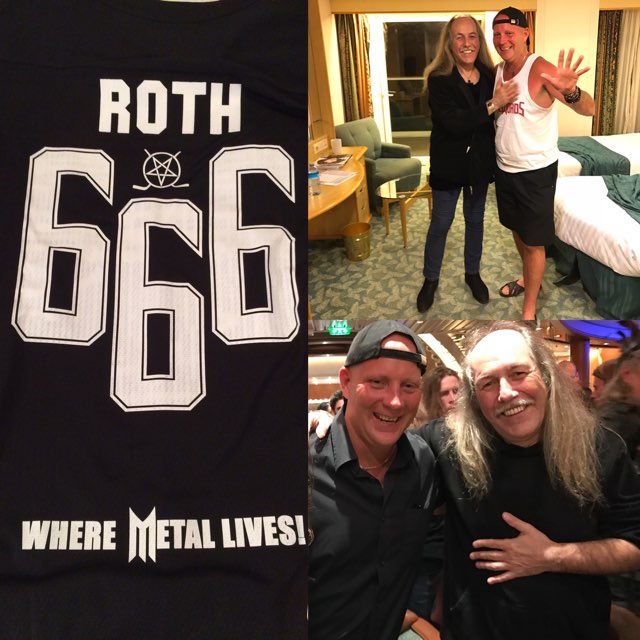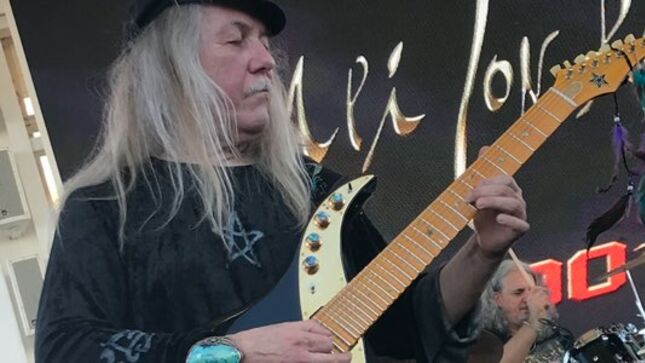
Let’s just let this one flow. Pretend you are in the interview room with us. A casual conversation with a guitar legend, who joined the Scorpions fifty years ago (in 1973 when Michael Schenker left) and performed on these pivotal albums: Fly To The Rainbow (1974), In Trance (1975), Virgin Killer (1976), Taken By Force (1977) and Tokyo Tapes (1978). Some purists prefer these early classics over the band’s more mainstream output, when they became one of the biggest bands on the planet, to date selling over 100 million albums. Keep in mind, in 2017 on the seventh edition of 70000 Tons of Metal, BraveWords had the honour of first meeting this guitar icon and we started by gifting him one of our personalized jerseys, but due to his faith, he refused it because of the three sixes, which has always been a tongue-in-cheek numeral and not any religious insult. It’s just heavy metal. And at the end of the day (see photo at the bottom) we just laughed it off and kept partying! So when we met up again last month, he jokes about my Slayer top and pentagram pendant and matching tattoo. So this recent 70000 Tons Of Metal interview commences with a fun bit of banter. The CMM publicist setting up the conversation said we would have 10 minutes with him. We had more. Here we go… take a ride with us on "The Sails Of Charon".
BraveWords to publicist: Okay, see you in nine minutes.
(An automated voice from Uli Jon Roth's phone says, "Nine minutes starting now.")
Roth: "It picked up your nine minutes. Wow".
BraveWords: Why would that pick up?
Roth: "It's your voice. But you don't have a German accent?!"
BraveWords: But I put on my voice recorder, so why would yours go off? That's really strange. That's eerie.
Roth: "Yeah, well, you see, it's all these pentagrams, I tell you. That's what it is."
BraveWords: So, let's start with that.
Roth: "No, no, no, no, no, no."
BraveWords: You don't want to start with that? You don't want to talk about your faith? (Laughs)
Roth: "Not in five minutes."
BraveWords: So, let's talk about what's going on in your world, musically? What were you doing during COVID?
Roth: "During COVID I didn't do any music, I wrote a book. A big book, a thousand-page kind of tome. And I managed to finish it, too. It was, for me, dare I say, a great time. For everybody else it was terrible, but it gave me time to reflect, it gave me time to do what I normally can't do. So that was good. But, now we're back in the real world, and touring starts again. We're looking forward to a big American tour and a big North American tour in September, doing some festivals in the summer, and yeah, I've been doing some recording. We're working towards a big orchestra show in Germany, which is called The Alpha Experience, and that's really my next big thing. And that takes months of preparation, so in the spring there's not really any touring, it will be mainly devoted to that."
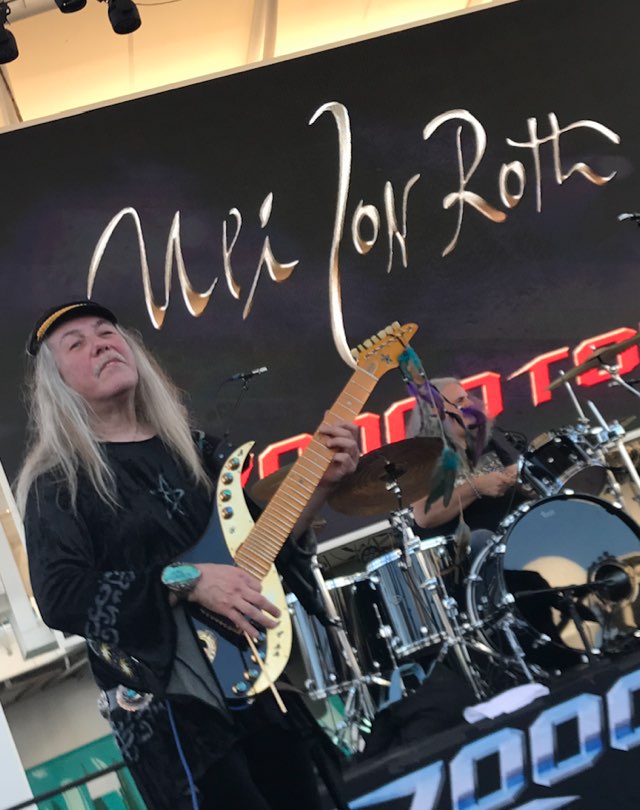
BraveWords: Is the road an addiction for you?
Roth: "No. No. Absolutely not. I used to really like touring, but when the COVID thing happened and I kind of had to go cold turkey, like everybody, it was quite a revelation. Because I realized that I actually suffered from road burnout. I'd been playing too much. If you do, like one hundred plus shows a year, that means you're on the road for way more than one hundred days, and it takes it out of you, you know? From one airport to the next, very often not getting enough sleep, basically. It's like a constant sleep malnourishment, that's my experience. And, what's more, you can't be really creative. I mean, like on the ship here, that's different, I can do things, I can write, I can think, but when you're on the airplane you can do a little bit, but I find that it is talking a lot of energy, etc., and so I decided to take a step back and do less of that, and get back more into the creative things. I've been enjoying that tremendously for the last three years now. I want to keep that up."
BraveWords: So, what you you think when bands from the ‘80s, like Iron Maiden, are on the road and they play three hundred shows on tour?
Roth: "Unthinkable, but back then they were all a lot younger, and that was their life. The Scorpions are the same. In the ‘80s I hardly played any shows. I mean, I did some Electric Sun tours, but not compared to these bands that were touring up and down the country. And in the ‘90s, I took a sabbatical of thirteen years, where I only played a handful of shows during that time. So, no, I'm not addicted to it, but normally I do like it. If it's within reason."
BraveWords: Let's change lanes. Hendrix was always a great topic that we talked about in the past, and your passion for him.
Roth: "Yeah. And what?"
BraveWords: What would you like to learn from him? If he was sitting here, is there something he plays that you would like to ask that question, "How do you do this"?
Roth: "Not really. I think I've already learned so much from him, I don't want to steal any further. Leave the man alone. He's given so much to so many people, including myself. No, the mysteries about Jimi, I mean I figured out most of the guitar kind of stuff, but that's not really where the mystery is. There's a lot of things about Jimi Hendrix that we will never know. There was a lot more to him than meets the eye, and he was a true artist, and one of the greatest artists, you know? Of all time. And that includes classical musicians. So, it's those things that make his contribution really important I think, and that's also the reason why he is also not going to be forgotten. He will be a figure as long as civilization exists, some people will remember him."
BraveWords: Did you steal anything from Jeff Beck?
Roth: "I certainly learned a lot from him. In 1975 when Blow By Blow came out, I used to listen to that album a lot and it gave me a good idea about several things. I also saw him live in 1972 when I was still in my early stages, and it was a truly phenomenal guitar sound, I remember. The only one who had a sound on that level, that I'd seen before and heard before, was Jimi Hendrix. So, Jeff Beck was always outstanding. I got to meet him once, a few years ago, and he was very, very nice to me, so I'll remember that as my little something. I've recently recorded a track in his honour, which has maybe a little bit of a Jeff Beck feel. Just after he died, I've got a Patreon channel, and in our Zoom conference I played that track for them live, and then I put it online. Yeah, and they seem to like it a lot. It was called ‘The Cry’. In fact, I'm going to play it on this ship here, as part of my Sky Academy thing, a special tribute to Jeff. And, come to think of it, just fifteen minutes ago I got a phone call from my good friend, John Oram, who's called the Father of British EQ - he's known for building all of these Trident mixers in the 80s, he was on tour, I chased him with the Beatles. He's goes way back, he's a pupil of (Thomas Walter) Jennings the founder of Vox, he's from those days, and he just said, 'We're going to do a track in honour of Jeff, written by Curtis Mayfield", and would I want to do the guitar for it? They're going to record it in Waters, in the studio, John Oram's studio, which is just around the corner from Jeff Beck's estate. And, I used to live there too, near Waters, I lived there for three years. I did a couple of albums here, yeah. I had a big farm there, it was beautiful, I loved it. So, that will bring back some memories."
BraveWords: How does it feel when you're watching all of these icons, and they're passing away?
Roth: "Yeah, I mean, you know, like Jeff Beck going away is really like the end of an era, because there are so few people left from that early ‘60s period who had the magical sound from back then. There's only a few people who still have that vibe about them. And that was that generation of Jimi Hendrix, of Eric Clapton, of Jeff Beck, he was one of those three. Then you have Jimmy Page, you have David Gilmour. Then, slightly later you have Ritchie Blackmore. England produced so many great guitar players, but those were the ones that basically wrote history on the guitar, and in rock, and Jeff Beck was one of them. He was at the real cutting edge. He wasn't quite as successful in monetary terms as Hendrix and Clapton, but his contribution to guitar playing, or rock, or music, was enormous."
BraveWords: And all of those guitar players you mentioned, for the most part, were really inspired by the Blues players. Were you inspired by the Blues players?
Roth: "Initially, yes. But I was inspired by the second generation. B.B. King, and Freddie King, those were the people, Albert King, those were the people who Jeff Beck looked up to in this generation. And I looked up to people like Eric Clapton to start with. Hendrix came a little bit later for me, and Jeff Beck came even later for me. But then, of course, being in love with the guitar, I checked out the roots, and I checked out Albert King, and I thought, 'Wow. Yeah', I could tell where Jimi Hendrix got his ‘Red House’ from. There was a lot of Albert King there, and of course, B.B. King. So, I relate to that, and I used to play the Blues, initially. But there came a point where I started to move more towards the classical and moved away from the Blues. But to this day what is still in my playing is these bendy, wailing notes, which comes from the Blues, including the Blue notes. And my way then was to kind of bring that and mix that in with the classical approach, which is sacrilegious for both worlds, I suppose. But, it kind of, for me, it works. I ended up playing things like Vivaldi's Four Seasons concertos, which is a violin concerto, on the lead guitar, and playing it with the feel of a rock guitar player although I know exactly how to do it the puritan classical way. I chose to do it in this way. And a lot of people in the classic world, they really understood that, and they liked it, and they said, 'Yeah, absolutely'. But there was one guy who said, 'That's obscene vibrato!', and he was right. He got it. I mean, the word 'obscene' in terms of classical playing, baroque playing, I put some Hendrix vibrato into Vivaldi, and to some puritan people in the classical world, that's absolute sacrilege and the height of bad taste. I'm guilty of this, and I'm a little bit proud of it, because I think the end-result was quite exhilarating. At least for my ears!".
BraveWords: Don't you find it interesting that, if you connect the dots going way back to the Blues era, and tie in the Beatles in the ‘60s, and Cream and all these bands, like, that's the roots of hard rock and heavy metal.
Roth: "Oh yeah, absolutely. Of course. There would be no heavy metal without bands like Cream and Led Zeppelin up front. But all of these are completely different from what metal is nowadays. They were a lot more daring, they were a lot more dangerous in the true sense of the word, because all that stuff had never been done before. It felt that way. I remember what it felt like to listen to Jimi Hendrix back then, it was revolutionary, the sound. Now, the metal of the ‘80s and ‘90s became a lot more corporate. It became - they used more aggression, louder, faster, whatever - thinking that this would make it more 'dangerous'. But, to me, it isn't. These other elements are more in the field of being creative and coming top with something really new. So, metal actually didn't really bring that much new. I felt it was, in a way, a step back. Because all these bands like Cream, Hendrix, these trailblazers, Led Zeppelin..."
BraveWords: The Yardbirds.
Roth: "Of course, the Yardbirds very early on. But also then, later, Deep Purple, Black Sabbath, they all had one thing in common, they were playing loud, wild - The Who - but extremely dynamical within that. Now, this dimension of dynamics, in metal it doesn't exist. The foot is always, the pedal is, always at 120. Not at 110, at 120. The speed is very often, like, totally over the top, and everything is hyper distorted and hyper aggressive, down to the last minute detail. So, it's almost like a caricature of what it once was, and that is what it sounds like to me. That's why I'm not a fan of metal, never have been. But, then again, what is metal? Like, if I speak to Bruce Dickinson, for instance, and we had this discussion once. I said, 'You're not really metal, your'e a hard rock band', and he completely agrees, you know? Because Maiden is still old-school. They still play with these dynamics. Yes, they play distorted, but they still have this old-school kind of organic touch, this organic feel, which you can touch with your hands almost. Metal always has an abrasive edge that I don't like. So, that's why I'm not a big fan of metal. Never have been, never will be. Are there good bands in metal? Of course there are. Are there some great pieces? Yes, of course there are, I don't deny any of that. It's just, most of it doesn't speak to me."
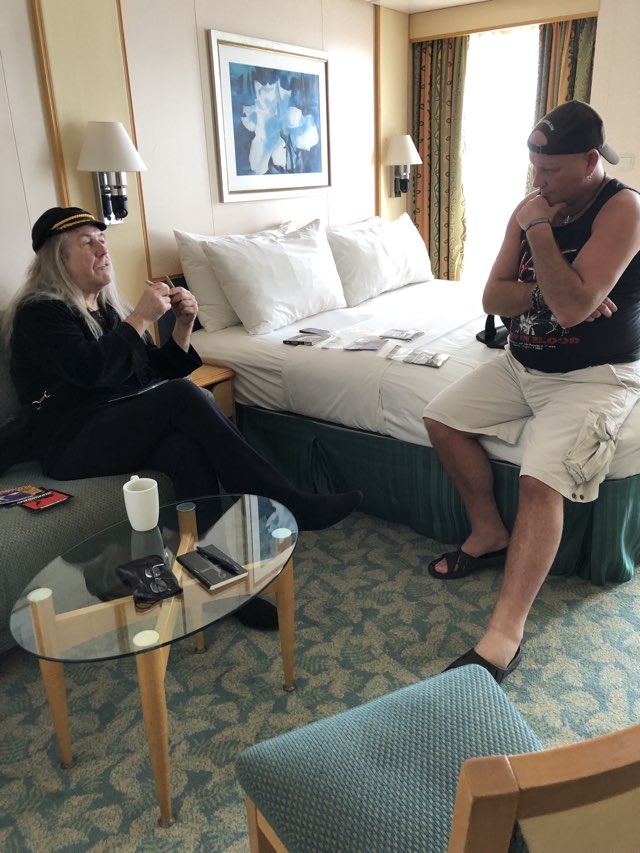
BraveWords: Where did you think The Scorpions fit in, in the ‘70s when Sabbath was being born and Deep Purple?
Roth: "Absolutely not metal, The Scorpions. They were forerunners of metal. To me, they were melodic hard rock, with the absolute emphasis on 'melodic'. I think the reason why The Scorpions made it big was they were melodically so strong. From the very beginning, it was so unusual, because most bands have only one or two people who've got this sense of melody that pushed them into another dimension. The Scorpions had, well, they had Rudolf (Schenker), they had Michael (Schenker), they had Klaus (Meine), and myself - so there were actually four people in The Scorpions, each one of whom had this sense of melody. And it cut through on every single track. That's why The Scorpions were able to do, in the act; all this really successful songwriting like ‘Rock You Like A Hurricane’, or ‘Winds Of Change’, or ‘Send Me An Angel’. Most other bands didn't have that. A lot of bands became successful with great riffs. Like Deep Purple - mainly riff-based, and an attitude, and great ideas, and of course great vocals, but then The Scorpions also had great vocals, we had Klaus Meine. We had me, who couldn't sing, but Klaus was so good that it didn't really matter. In fact, I remember when I came with some of my songs, like ‘Dark Lady’, I wanted Klaus to sing it. I sang the demo and Dieter (Dierks) said, 'You sing that, because your voice had that kind of feel. This is not for Klaus'. And that was that. It didn't damage The Scorpions, we survived."
BraveWords: There are so many people I talk to in the metal community that were inspired by Michael Schenker. What was your relationship? And was he truly the star? Did you watch him in awe? How did you work together?
Roth: "No, we always felt like equals. We knew each other from very early on, way before The Scorpions. He went his way and I went mine, but there were a lot of parallels between us. You know, when he went to UFO, he forged a path. He had already found his sound and his style, and UFO was then the first real incarnation of all that. Later on he carried on with MSG, but it was always Michael Schenker. Unmistakeable, a complete one-off, to me he is one of the all-time greats for his sense of melody and his approach and sound. He's one of the architects of rock. No question about it."
BraveWords: What would you consider the feather in your cap in terms of one Scorpions track?
Roth: "Well, that would have to be ‘Sails Of Charon’, you know, because that's the one that is most referred to, and I think it maybe pushed the envelope more than any of the others at that time. It could have almost been, I wrote it at the time that I started writing the music for Electric Sun, it would almost have been that. Had I stayed on in The Scorpions, I would have written more in that vein, I suppose."
BraveWords: Did you hear Testament's version of it?
Roth: "Oh yes, that was very good. A lot of people have covered it, and most of them were not very good I thought, because most of them didn't really understand the rhythm. But yeah, that was really good. That was possibly the best one that I've heard.”
BraveWords: Awesome. Thank you so much.
(At this point, BraveWords gives Uli Jon Roth a special white t-shirt with the BraveWords logo. Roth is pleased and says that he appreciates it.)
BraveWords: Is there an English version of your book?
Roth: "It's all in English, but it's not yet published. I've got a copy in my room . In fact, I should have brought it with me."
(As Uli Jon Roth is signing some music memorabilia, he continues to chat).
Roth: "I was very sloppy back in the day in the sense that I didn't look much into the past, and I should have kept things more. I still have some stuff in storage, but I don't know, really."
BraveWords: What do you think about the vinyl craze?
Roth: "Well, we're riding on the coat tails of it, we're now releasing everything on vinyl."
BraveWords: You're going to make more money selling vinyl.
Roth: "I'll tell you, I have no problem with it the because I can't stand the small artwork. I'm very artwork driven, so for me the vinyl was always the thing, a cause to celebrate. The sound is not necessarily my cup of tea, but people don't buy it for the sound, they buy it for the experience, and a lot of them just for the collection."
BraveWords: Do you have a working turntable at home?
Roth: "We probably do, but I haven't used it. Actually, we do. It's in the other studio. But I can't remember when I put the last record on. We're going to re-release all of my back catalogue on vinyl now, and we're going to do deluxe editions. That means the first one is going to be Transcendental Sky Guitar. That will be quadruple vinyl, in a box set with some extra videos, etc., a lot of unpublished stuff. So, as I told you, I want to get back more to the creative side of things, and that's why I'm going to produce new stuff and at the same time we're going to re-release the old stuff in a better way. And that's all."
BraveWords: Do you remember the first LP or 45 that you bought?
Roth: "Yes. It was...oh that's nice!"

(At this point the conversation turns to an item he was signing for the BraveWords collection).
BraveWords: Do you have the Mobile Fidelity material?
Roth: "That's really nice. What is this?"
BraveWords: Audio Fidelity Gold Disc. They used 24 karat gold-plated compact discs in place of the super pure aluminium commonly used as the reflective coating.
Roth: "Hang on, I've got to film this, I've got to show this to my guy."
BraveWords: They're pretty rare now.
Roth: "Yeah? Hold, on, let me make a quick video of that. So what is this? What's different about it? Like a mini box set or what?"
BraveWords: It's just the coating. Apparently gold CDs last longer than silver or aluminum coated ones.
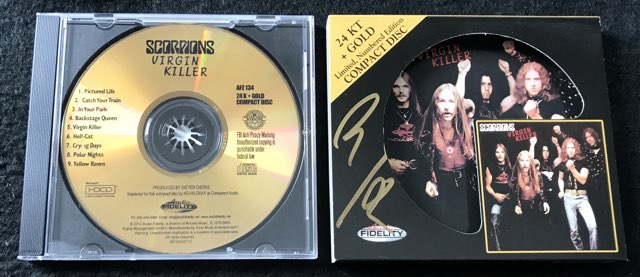
Roth: "By the way, we have an interview with BraveWords (as he turns the video toward the interviewer). With Martin Popoff in the olden days."
BraveWords: Martin Popoff is still my partner, yes.
Roth: "This is for my Patreon channel."
BraveWords: We are honoured to be here. This is my wife, Sephora.
Roth: "So now I'm interviewing you! Wow. Great to meet you. So, I've just signed these, the whole collection here, most of which I've never seen before!"
BraveWords: "Where's my royalty", that's what you should be saying.
Roth: “You know, actually I don't care about these things because if you start doing that..."
BraveWords: You'll drive yourself crazy.
Roth: "I tell you. Here, you can film me - no, not that way (the camera was pointed the wrong way)! Oh man! You're the worst photographer ever!"
BraveWords: That's why she's here.
Roth: "You're a journalist or what?"
BraveWords: Yes, I'm the journalist (laughs).
Roth: "Oh man, this is unbelievable." (He is still signing collection materials at this point). Oh Japanese versions, they always make such good stuff."
BraveWords: The obi strip is just beautiful.
Roth: "Yeah, with the obi. It's like Obi Wan Kenobi. Well, you're quite the collector, aren't you? Do you listen to all that stuff?”
BraveWords: Yes. BraveWords has one of the biggest collections on the planet. We're talking over 500, 000 pieces.
Roth: (To Sephora) Did you hear that?
BraveWords: Well, she's my wife. (Sephora chimes in, "I live with it!"). I have over 300, 000 CDs.
Roth: "Yes, but there's not enough time in a lifetime to listen to all that."
BraveWords: Here, I can put that back.
Roth: "I've ruined it."
BraveWords: It's all good. I ruined your video.
Roth: "Yeah, you could say that again. I'm not going to edit that out, it will be fun."
BraveWords: Yes, it will be fun.
Roth: "But we have met before, on the last cruise, and did you try to give me a t-shirt back then?
BraveWords: It was the jersey.
Roth: "Here's the new story. I've now got a new t-shirt, that's what he gave me (showing it on video). Last time he wanted to give me a 666 t-shirt, and I said, 'No, thank you'.
BraveWords: You know who wears that?
Roth: "Who?"
BraveWords: Me. Weekly, at my hockey game. I wear it, your jersey, Roth 666. I wear it when I skate.
Roth: "Oh yeah?!"
BraveWords: Absolutely. It gives me lots of luck!
Roth: "Well, good luck to you. Ball hockey or ice hockey?"
BraveWords: Ice hockey. Can we do one photo before we go?
Roth: "Who is the photographer? Not you!" (Laughing).
